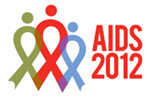Fight against AIDS will only be successful if discrimination is eliminated
Published on Tue, 2012-08-14 08:50
Participants at the 2012 International AIDS Conference criticized the prevailing discrimination against sex workers in the US and other social groups world wide. The conference, held in Washington DC from 21-27 July, saw the pledging of additional funding to fight HIV/AIDS by international donors, emphasizing the need for further research to combat the epidemic, reported Eurostep web site. During his opening speech, executive director of UNAids Michel Sidibé pointed to the prevailing discrimination against people suffering from HIV/AIDS world-wide. “It is outrageous that in 2012, when we have all the tools to beat the epidemic, we still have to fight prejudice, stigma, discrimination, exclusion and criminalization, not only in homes, but in streets, police stations and courtrooms. This is impossible for me to understand,” Sidibé regretted. Participants emphasized the need to provide those excluded groups with necessary drug treatment, which could be significantly improved in recent years. During the conference, experts also warned against a cutting of funding for the epidemic, amid the on-going economic crisis. The conference was held for the first time in the United States, after President Barack Obama had lifted the prohibition for people with HIV to enter the country, which however continues to deny entry to international sex workers — a situation that had led to considerable criticism ahead of the conference. Organizations fighting for the acknowledgement of sex workers and the importance of providing them with HIV/AIDS treatment had therefore decided to hold the first-ever Global Hub of the International AIDS Conference in Koltaka. The conference was attended by over 500 sex workers, drug dealers, doctors and social workers from around the world. Ahead of the conference, the UNAids report was published, focusing on the progress achieved in cutting the number of HIV infections by 90% from 1990 levels by 2015. According to the report, 22 countries, including Angola, Chad, the Democratic Republic of the Congo, Mozambique, Nigeria, Tanzania and India, are in need of further actions if the target is to be met by 2015. Seven countries, including Botswana, Burundi, Cameroon, Ivory Coast, Lesotho, Malawi and Uganda, are likely to reach the target if the decline in new HIV infections among children is accelerated, the report reads. Overall, global targets are on track to be met, the report claims, especially pointing to the impressive progress achieved in Sub-Saharan Africa. According to UNAids, the number of people receiving antiretroviral treatment could be accelerated from 100,000 in 2003 to nearly 6.2 million people in 2011. More information Source
|


